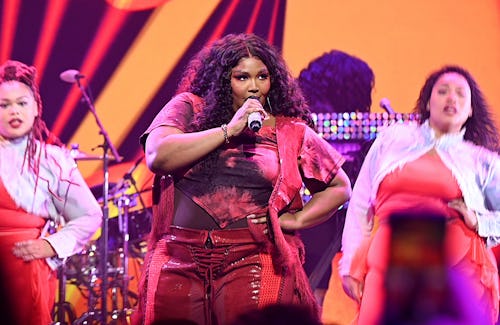
On Monday night Lizzo re-released her new single “GRRRLS” with a lyric removed that fans had complained was offensive. The original recording of the song included a derogatory term for a form of cerebral palsy known as spastic diplegia. She posted a statement to her social media that read, “It’s been brought to my attention that there is a harmful word in my new song “GRRRLS.” Let me make one thing clear: I never want to promote derogatory language. As a fat black woman in America, I’ve had many hurtful words used against me so I overstand the power words can have (whether intentionally or in my case unintentionally).” The new lyric now says, “hold me back” in place of the term that offended people, and the new version has already been substituted on streaming platforms.
Of the fans who criticized the singer over the weekend, Hannah Diviney took the time to explain why the lyric was so hurtful on Twitter. She wrote, “Hey @lizzo my disability Cerebral Palsy is literally classified as Spastic Diplegia (where spasticity refers to unending painful tightness in my legs) your new song makes me pretty angry + sad. ‘Spaz’ doesn’t mean freaked out or crazy. It’s an ableist slur. It’s 2022. Do better.” Diviney continued to the BBC, “Cerebral palsy is literally classified as spastic diplegic cerebral palsy, which basically means that I have spasticity, or tightness, in my legs specifically. It's something I can't control and it makes my life quite difficult and painful. Seeing that word used to suggest someone has lost control or had an emotional outburst is really weird because that's not at all what it's like; and that's not at all what my life as a disabled person is.”
Disability advocates welcomed the alteration to the song and Lizzo’s apology. Callum Stephen wrote, “Everyone makes mistakes - what is important is how we respond to them. She could’ve said and done nothing, or gaslit the disabled community and vanished, but she didn’t. This should be the precedent.” It is important as an ally to any marginalized community to listen and be willing to learn — which is exactly the kind of behavior Lizzo exhibited. Author Malorie Blackman put it succinctly, “We're all only human and we all sometimes get things wrong. It's how we handle the resultant criticism and move forward that helps to define us.” Lizzo’s apologetic correction of her mistake will hopefully help shape how others in her position might respond in similar situations moving forward.







